Beginning in Auckland, New Zealand on July 20, and ending in Sydney, Australia exactly a month later, the 2023 FIFA Women’s World Cup is one of the highlights of this year’s soccer calendar. For the first time ever, the tournament will be co-hosted, and for the first time ever there will be 32 teams instead of the previous 24, with several teams making their tournament debuts. The best footballers in the world will battle it out for the sport’s ultimate prize, and legacies will be forged as one team is left standing at the conclusion of the 64-match competition, which will culminate at Stadium Australia. Here is everything you need to know ahead of the Women’s World Cup, from tournament favourites and players to watch, to coaches and kickoff times.
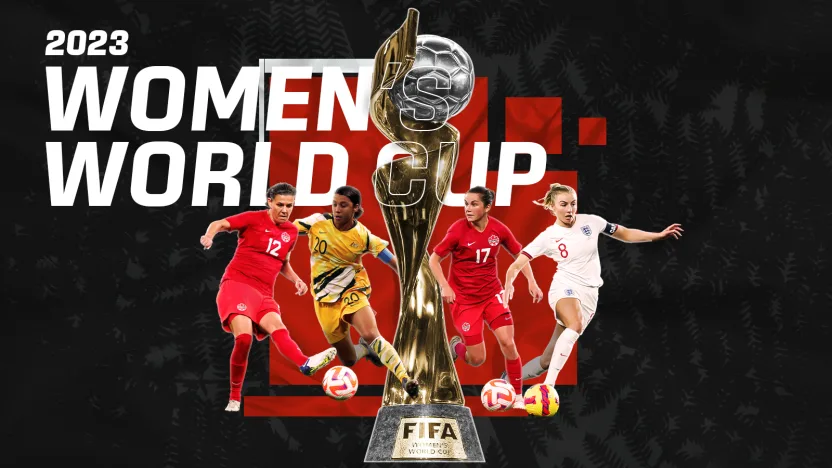
About The Hosts
This tournament, as mentioned, will be held in two countries for the first time, as 32 teams head Down Under to determine who the best team in the world is. One of the faces of this tournament has been Australia and Chelsea superstar Sam Kerr. Among the best footballers on the planet at the moment, Kerr scores goals for fun for club and country, and despite being only 29, has already been involved with the national team for 14 years. Seeing one of the game’s great players perform on her home stage is always a privilege, and Kerr will be keen to bust out her iconic backflip in front of Matildas fans.
Arsenal duo Steph Catley and Caitlin Foord always put on a show as well, and San Diego Wave midfielder Emily van Egmond is as important as anyone in the squad. All with a decade or more of international experience under their belt, this group will be looking to get out of Group B, which includes Canada, Nigeria and the Republic of Ireland, and see if they can go on a run from there. Australia has qualified for all but one of the nine Women’s World Cups, missing out on the inaugural edition in 1991. Their best performance came in 2007 with a 6th-place finish, but in 2021 they finished fourth at the Tokyo 2020 Olympics, signs that they’re capable of competing with the world’s best. On the men’s side of things, Tim Cahill is the most famous Australian. The former Millwall, Everton and New York Red Bulls midfielder scored a men’s national team record 50 times in 108 matches for the Socceroos, and was Australia’s record goalscorer until Kerr passed him with her 51st goal in January 2022. Kerr paid tribute to Cahill with a goal celebration at the 2019 Women’s World Cup, boxing the corner flag as Cahill did so many times over the years.
New Zealand is making its fifth consecutive appearance on the biggest stage since Australia switched from the Oceania Football Confederation to the Asian Football Confederation in 2006, after missing out on the prior three editions. Their best World Cup result was eleventh place in the inaugural 1991 tournament, although they finished with three losses from three – and to this day are 0-3-12 in World Cup matches, never making it out of the group stage. They’ve found most of their international tournament success in the OFC Women’s Nations Cup, winning it six times, including four straight times after the aforementioned Australian switch to the AFC. They didn’t take part in the 2022 edition, as they already qualified for the 2023 Women’s World Cup as hosts. The current women’s national team, nicknamed the Football Ferns, stars defender (and captain) Ali Riley and midfielder Ria Percival – two longtime internationals who have been at the forefront of the program since future Canadian men’s and women’s head coach John Herdman was in charge of the New Zealand program from 2006 to 2011. Riley is currently plying her trade with her hometown Angel City FC in the NWSL, while Percival is with Tottenham Hotspur in the Women’s Super League, a club teammate of Canadian defender Shelina Zadorsky. Percival has some Canadian connections, as she was once a member of Ottawa Fury Women, and she scored the lone goal from the penalty spot at TD Place in a 5-1 defeat in the first match of Canada’s Olympic gold celebration tour in October 2021. Not playing in her home World Cup will be defender Abby Erceg. One of the best footballers in Ferns history, and the first New Zealander to play 100 times for the national team, Erceg retired from national team duty in early January to focus on her club career with North Carolina Courage. New Zealand is in a group with 1995 champions Norway, the Philippines, and Switzerland. Chris Wood is a player from New Zealand that fans of the men’s game will recognize. The 31-year-old striker has played in England for over a decade, most prolifically with Burnley and Leeds United, and is his men’s national team’s all-time record goalscorer. Something that will be very noticeable during the tournament, as it has been in the lead-up, is the inclusion of the New Zealand indigenous language Māori in an official capacity. Aotearoa is the Māori name for New Zealand, and the country is often referred to as “Aotearoa New Zealand” by many. The Football Ferns put together a video last year with some key terms to know ahead of this summer’s tournament.
Tournament History
This will be the ninth edition of the Women’s World Cup, and the first time it’s been held in the southern hemisphere. The New Zealand portion of the tournament will be the first World Cup games, for either the men’s or women’s tournament, held in an Oceania Football Confederation country. Australia joins China (1991, 2007), South Korea and Japan (men’s World Cup in 2002) and Qatar (men’s World Cup in 2022) as countries from the Asian Football Confederation to have hosted matches. The United States are the winningest team in Women’s World Cup history, lifting the trophy four times, including the last two editions. Germany has won twice, while Japan and Norway have one star above their crests as well. Sweden is the most successful team to have never won it, finishing as the runners up once, and fourth place on three occasions, including at two of the past three tournaments. Being the bridesmaid instead of the bride is something they have unfortunately become accustomed to, as they haven’t won a major international tournament since the 1984 “European Competition for Women’s Football”, now known as the Women’s Euros. They’re always there or thereabouts, however, including finishing second to Canada at the Tokyo 2020 Olympic Games. Canada has played in all but one Women’s World Cup tournament, missing the inaugural one in 1991, while fellow Concacaf nations Jamaica and Costa Rica will be making just their second appearances. Canada hosted in 2015, a tournament won by the Americans, with their best-ever result being a fourth-place finish in 2003. Brazilian legend Marta, who will likely play in her final Women’s World Cup in 2023, is the tournament’s all-time record goalscorer, with 17 goals since making her tournament debut back in 2003. It won’t surprise you to hear that Christine Sinclair, the all-time record holder for most international goals, is the highest scoring Canadian in World Cup action, scoring 10 thus far since her first in 2003.
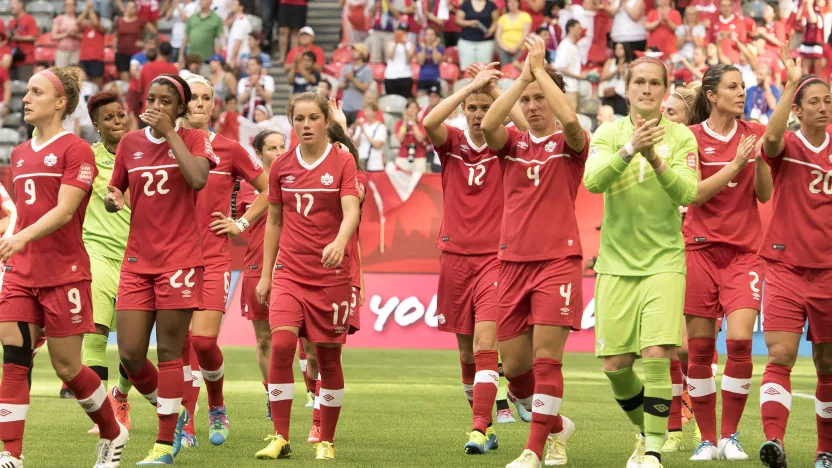
Who has qualified? Who will Canada play and when?
As is customary, two of the 32 spots were automatically given to the hosts, Australia and New Zealand. Joining the Aussies from the Asian Football Confederation (AFC) are regional powerhouses Japan, China, and South Korea, as well as two World Cup debutants, Vietnam and the Philippines. There are also two debutants representing the Confederation of African Football (CAF), Morocco and Zambia. They’re joined by returnees Nigeria and South Africa. Returnees make up the South American Football Confederation (CONMEBOL) delegation, with Brazil, Argentina and Colombia vying to become the first team from South America to win the sport’s ultimate prize. From North America (Concacaf), the twice-reigning champions from the United States, as well as the current Olympic champions Canada, are joined by Jamaica and Costa Rica. Europe (UEFA) is sending the most teams to Australia and New Zealand, with former champions Norway and Germany among them. England, Spain, Sweden, France and the 2019 runners up from the Netherlands are also heading Down Under, alongside Denmark, Italy and Switzerland. Making their debut is the Republic of Ireland, who make their first appearance at a major international tournament after a playoff victory over Scotland in October 2022. You’ll notice that’s only 29 teams. Ten teams from six confederations will battle it out for the three remaining spots in February at a qualification tournament in New Zealand. Chinese Taipei and Thailand represent the AFC, Cameroon and Senegal are from the CAF, Haiti and Panama look to qualify from Concacaf, along with Paraguay and Chile from CONMEBOL. Papua New Guinea and Portugal represent the OFC and UEFA, respectively, as well. The teams have been drawn into three groups, with the winner of each group earning a spot at the World Cup.
Canada will be in Group B, alongside the hosts Australia, Nigeria, and the World Cup newcomers from the Republic of Ireland. They’ll open their tournament against Nigeria at Melbourne Rectangular Stadium on July 20, with kickoff at 10:30 p.m ET, before heading to Perth for a match against the Republic of Ireland at Perth Rectangular Stadium on July 26, kicking off at 8 a.m. ET. From there, they’ll head back to Melbourne on July 31 for a 6 a.m. ET kickoff against the Australians.
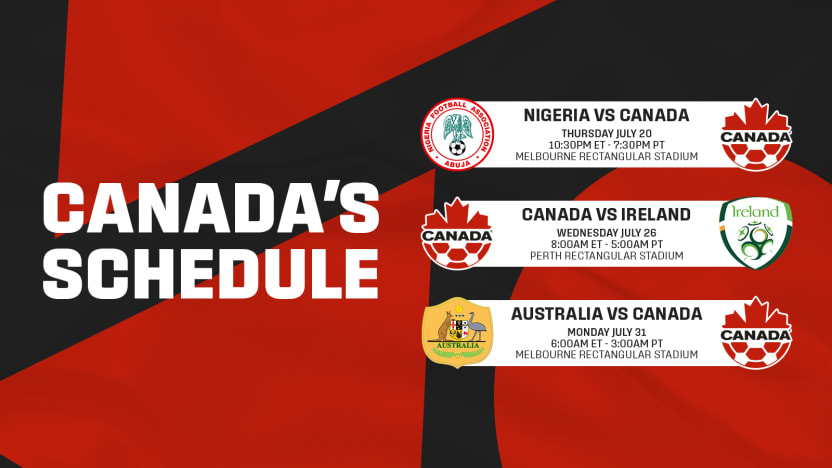
Who are the favourites to win it all?
Anything can happen in football, that’s the reason why matches are played on the pitch and not on paper, but as with any tournament, there are a few teams that will be seen as favourites heading into the World Cup. Look no further than North America for two contenders, the United States and their neighbours to the north in Canada. Twice-reigning champions, and the winningest team in Women’s World Cup history having lifted the trophy in four of the eight prior tournaments, the United States will always be in the conversation. Since Vlatko Andonovski took over from Jill Ellis after the 2019 World Cup, the United States’ dominance hasn’t been as indisputable as people have come to expect, but they’re also a team you should never underestimate. They boast some of the best players on the planet, the red-hot striker Alex Morgan among many who have been part of those two previous squads and know what it takes to win on the biggest stage. Their incredibly high standards aren’t always met, but the fact that anything less than winning the World Cup is considered a failure is proof enough that they can be a force to be reckoned with. Canada, meanwhile, enters the tournament as the winners of the most recent global major tournament, the Tokyo 2020 Olympics. Canada will take the confidence from that victory into the World Cup, but as head coach Bev Priestman has made clear in the year and a half since, they know they’ll have a target on their back. Canada has a blend of generations that includes the greatest international goalscorer of all time Christine Sinclair and younger core of difference makers that are keen to build on the successes of their more experienced teammates. Canada has proven that they have the ability to grind out results against top opponents – there’s no better proof of that than their road to Olympic gold – so now it’s time to show that they can do it at the World Cup as well.
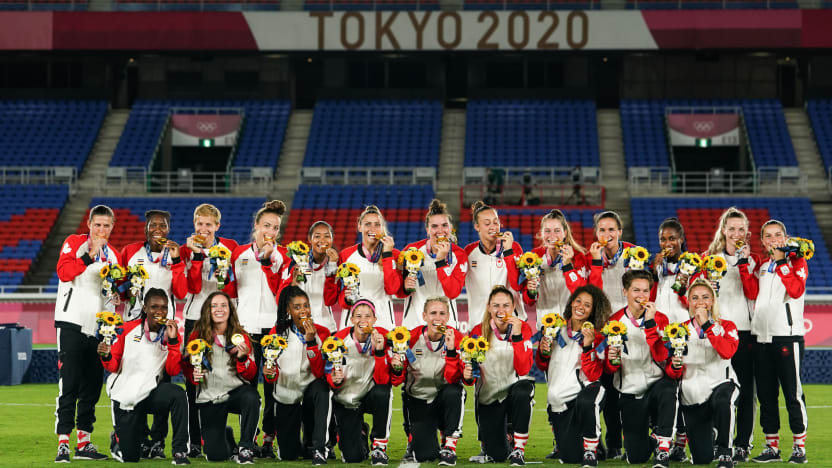
England are also full of confidence, having won the Women’s Euros in 2022, and on the back of two decent World Cup performances as well. They finished third in Canada in 2015, and then fourth in France in 2019. Carrying the momentum into 2023 in search of a first Women’s World Cup victory is a priority for the Lionesses, and with the way they’ve dismantled opponents under Sarina Wiegman, it would be unwise to bet against them. Don’t rule out their Euro 2022 final opponents Germany either. Remarkably, seven years without a major trophy is the joint-longest stretch Germany has had since they’ve been a national team. It matches the one from 1982 and their first ever international match to their first Euros win in 1989, back when they competed as West Germany before reunification with their Eastern counterparts in 1990. They boast a very strong squad that was within reach of the Women’s Euros crown last summer, and could absolutely add a third World Cup star above their crest this year. Brazil is also a team to watch. While they’ve absolutely dominated the Copa América Femenina, winning eight of the nine editions, including the last four, a title at a major global tournament has thus far eluded them. With the legendary duo of Marta and Cristiane possibly playing in their final World Cups, they’ll be motivated to go out with a bang, and improve upon their best-ever finish, second place in 2007. With some superstars in their ranks, also possessing Debinha and Rafaelle Souza among others, this might just be the year Brazil is able to clear the final hurdle. Some other teams to keep an eye on include Spain (who can absolutely win this tournament if their off-field concerns are dealt with), the co-hosts Australia led by the great Sam Kerr, perennial dark horse France, and Sweden – who are also there or thereabouts at most international tournaments, but have not won one since the 1984 Euros.
Who are some players to keep an eye on?
The obvious answer here is the player many regard as the best on the planet, Spanish midfielder Alexia Putellas. The Barcelona star is the focal point in any game she plays, and strikes fear into her opponents with her technical ability and cool head under pressure. She doesn’t let the occasion faze her, something Spain will need if they are to finally take that next step and start challenging for major trophies after several years on an uphill trajectory. Putellas has missed significant time with an ACL injury suffered on the eve of the 2022 Women’s Euros, but many are hoping that there’s enough time to get herself fit and firing on all cylinders before the World Cup.
If Putellas isn’t the player that comes to mind when asked who the best in the world is, there’s a good chance that title belongs to Sam Kerr, the Chelsea and Australia attacker who turns heads on a weekly basis. There’s a case to be made that Kerr, who will be the hometown favourite for as long as Australia are in this tournament, is the best finisher in the world. Coupling that with the motivation that comes with playing in front of an electric home crowd could be a lethal combination. Kerr is hitting her prime, and Australia’s record goalscorer will undoubtedly put on a show in Group B. Another player who should have fans turning on their TVs to watch is Brazilian attacker Debinha. The 31-year-old Kansas City Current forward (signed in January from fellow NWSL side North Carolina Courage) has an ability to create something out of nothing thanks to her superior technical ability on the ball, and also possesses an elite eye for spotting a pass or opportunity to put the ball in the back of the net. Add her to the legendary duo of Marta and Cristiane – who could very well be playing in their sixth and final World Cups together in 2023 – and Brazil’s attack will be a fun one to watch.
On a steady upwards trajectory in past years is young German midfielder Lena Oberdorf. After being named the best player in the tournament as Germany won the 2017 UEFA Women’s Under-17 Championship, Oberdorf has become a key member of Martina Voss-Tecklenburg’s team. The VfL Wolfsburg midfielder was part of the 2019 Women’s World Cup squad as a 17-year-old, but truly solidified her place among the world’s best young footballers at Euro 2022, winning Young Player of the Tournament. Every winning team needs a strong defensive presence, and Oberdorf provides that from the base of the German midfield. Yamila Rodriguez (Argentina), Barbra Banda (Zambia) and Wang Shuang (China) are also players that will have fans on the edge of their seats. Boca Juniors forward Rodriguez was the top scorer at the 2022 Copa América Femenina, scoring six for Argentina on their way to a third-place finish, while Racing Louisville’s Wang scored five in China’s gold medal-winning effort at the 2022 AFC Women’s Asian Cup. Banda wasn’t part of Zambia’s third place finish at the 2022 Africa Women Cup of Nations, but scored six goals in a breakout tournament for her at the Tokyo 2020 Olympics, which included two hat tricks, against China and the Netherlands.
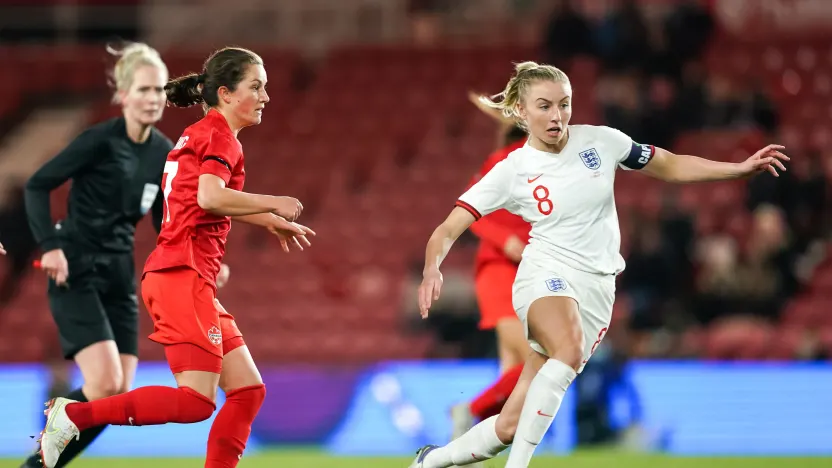
From a Canadian perspective, there are four players in particular to watch out for after strong performances in recent years. Reigning NWSL Goalkeeper of the Year Kailen Sheridan is expected to be the starting goalkeeper, as she has been since Stephanie Labbé retired in early 2022. Kadeisha Buchanan will be a key part of the group playing in front of her, as Canada may again lean on resolute defensive performances and good goalkeeping in Australia and New Zealand. In tournament football it is sometimes about not losing, something Canada rode all the way to Olympic gold – with Buchanan, the three-time Canadian Player of the Year and 2015 Women’s World Cup Best Young Player award winner, at the heart of that. While they’ll obviously want to continue to evolve as a team and become more consistent offensively, defending remains one of their strongpoints, and something to build around. Jessie Fleming, the back-to-back winner of that Canadian Player of the Year award in 2021 and 2022, might be Canada’s most important player, thanks to her ability to totally take control of games. Alongside Sheridan, Vanessa Gilles and Julia Grosso, Fleming was a part of the Best XI at last summer’s CONCACAF W Championship – the qualifying tournament for this World Cup – and finished tied atop its goal scoring leaderboard. Let’s not forget that it was her ability to perform in big moments that were partially responsible for Canada becoming Olympic champions as well. Able to play in the number ten position to lead the attack, or sit deeper and pull the strings from further back in the midfield, if Fleming is at her best, Canada could be a force to be reckoned with. Adriana Leon will also be vital to Canada’s success in 2023. Since the Olympics ended, there’s a case to be made that she’s been one of Canada’s most consistent performers, scoring eight times – including three times during Canada’s two-game series against Group B opponents Australia in September 2022. Leon is tenacious, physical, and one of Canada’s best finishers — qualities they will need from their attackers if they’re going to do any damage. Don’t rule out Christine Sinclair scoring at yet another World Cup, either. She’ll certainly see some action, even if it’s in a different role than she has in past World Cups – whether it be in terms of her spot in the starting lineup, or where she plays on the pitch. She has spent a lot of time in midfield for Canada lately, as her football IQ hasn’t regressed while her ability to run for 90 minutes game in and game out perhaps has. Canada has some brilliant footballers at its disposal, the question remains what the best way is to get the best out of everyone simultaneously.
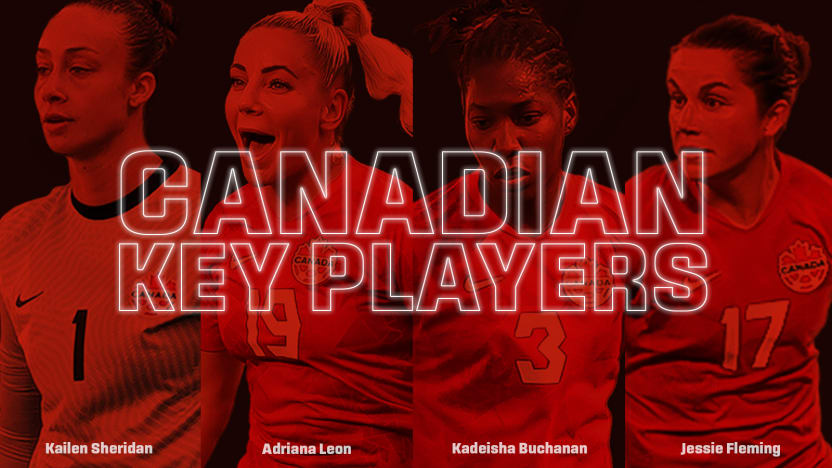
Who are the coaches?
Some of the best tacticians in the world will be attending this tournament with their respective national teams, including some of the most decorated coaches in the sport. The Football Ferns are led by Czech head coach Jitka Klimková, who has been in charge since September 2021. Klimková previously coached New Zealand’s women’s U17s squad, and was an assistant for the U20s and senior national team – also spending time with the United States U19s and U20s. She was on the American staff for the 2015 World Cup in Canada, which the Americans won. Australia, meanwhile, are coached by Tony Gustavsson, who like Klimková spent time as an assistant for the United States women’s national team before landing his current job. Mostly coaching in his native Sweden prior to moving to America, Gustavsson was an assistant to Jill Ellis for her World Cup winning sides in 2015 and 2019, before taking on his current role in September 2020. Gustavsson, who led Australia to a fourth-place finish at the Tokyo 2020 Olympics, is ambitious, and has said that he “wouldn’t be here” if he didn’t think winning the World Cup on home soil was a real possibility. The best coach at the 2023 Women’s World Cup might just be England’s Dutch gaffer Sarina Wiegman. Wiegman has won the past two Women’s European Championships, in 2017 with the Netherlands side that she played nearly a hundred times for during her own playing days, and again last summer with England. Under Wiegman, England has been dismantling teams, including several potential World Cup opponents. They’ve fully bought into her and her methodology, and it is clearly paying dividends. With the Netherlands her teams went 52-9-11 with a +151 goal difference, an incredibly successful tenure that also included being runners up to the United States at the 2019 Women’s World Cup.
Wiegman’s England won the Euros against Martina Voss-Tecklenburg’s Germany side that will be looking to go one better at this summer’s World Cup. Voss-Tecklenburg was also a successful footballer in her playing days, winning four Women’s Euros titles between 1989 and 1997, and finishing second at the 1995 World Cup. As a head coach she won the 2009 UEFA Women’s Champions League with FCR 2001 Duisburg, got Germany within touching distance of last summer’s Women’s Euros, helped Switzerland qualify for their first Women’s World Cup in 2015, and got Germany to the quarterfinals of the 2019 Women’s World Cup. A first international trophy as a manager has thus far eluded her, but on Germany’s current trajectory, they’ll certainly be in the conversation again. Pia Sundhage leads Brazil into the World Cup for the first time after the legendary manager took over after the 2019 tournament. Sundhage led the United States to Olympic gold medals in 2008 and 2012, as well as a 2011 Women’s World Cup silver medal, before returning to her native Sweden to lead their national team to a 2016 Olympic silver. Since taking over Brazil, Sundhage guided them to the 2022 Copa América Femenina title, and in convincing fashion – not conceding a single goal on their way to lifting the trophy. Canada, who won Olympic gold at Tokyo 2020 with Bev Priestman at the helm for her first major international tournament at the senior level, will again be led by the English head coach. After a year in which Canada lost just three times in 17 matches – all three defeats were by just one goal as well – Priestman is continuing to establish herself as a top manager, and a strong performance at the World Cup would only add to her growing legacy. Priestman is married to former New Zealand international midfielder Emma Humphries, for an added connection to the World Cup co-hosts.

Locations and Stadiums
As mentioned, this tournament will be co-hosted across two countries, Australia and New Zealand. Six of the ten stadiums are across five Australian cities: Sydney (Stadium Australia and Sydney Football Stadium), Brisbane (Lang Park), Melbourne (Melbourne Rectangular Stadium), Perth (Perth Rectangular Stadium), and Adelaide (Hindmarsh Stadium). Four cities in New Zealand will play host to games as well: Auckland (Eden Park), Wellington (Wellington Regional Stadium), Dunedin (Forsyth Barr Stadium), and Hamilton (Waikato Stadium). The final will be held at Stadium Australia, which will also be hosting one of the semifinals – the other being played at Eden Park. Those two, along with Wellington Regional Stadium and Lang Park will be the site of the quarterfinals. Lang Park and Sydney Football Stadium will be familiar to Canadian women’s national team fans, as they were the sites of 2-1 and 1-0 wins, respectively, for Canada in a pair of friendlies in September 2022. For the first time in Women’s World Cup history each team will have their own dedicated training base with training facilities and accommodations. Canada will be based out of Olympic Park, a recreation facility once built and used for the 1956 Summer Olympic Games in Melbourne. Canada’s first and third group stage matches, against Nigeria and Australia, respectively, will take place at Melbourne Rectangular Stadium on July 20 and July 31, with a match against the Republic of Ireland in between – on July 26 at Perth Rectangular Stadium.

Where can I follow the tournament?
The tournament will be available to watch live on TSN in Canada. Follow all the action at CanPL.ca as well, as we will have full coverage of the women’s national team before, during and after the tournament, as always. If you’re feeling adventurous and want to make the trip Down Under, tickets are still available for purchase.
